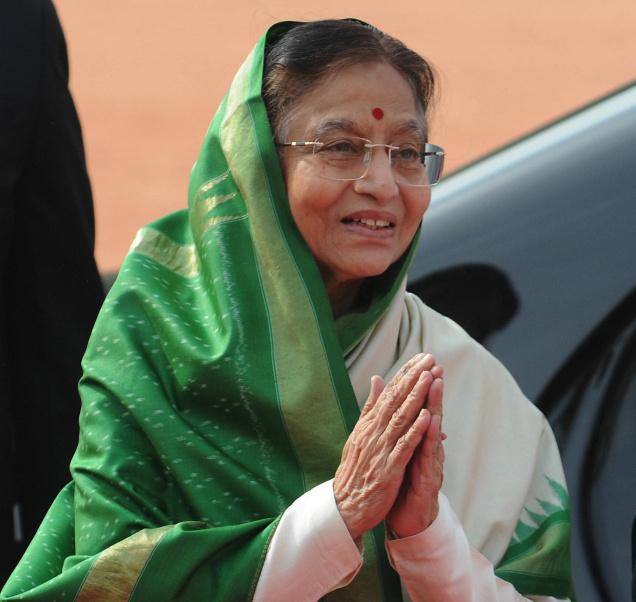
Ms. Patil, whose term ends in July, on Thursday shared with The Hindu her experiences as President and her views on what is required for nation-building.
She said it was imperative to usher in electoral reforms to maintain the country's secular and democratic characteristics. Education, women's empowerment and focus on moral values should be at the core of the reforms.
The interview ended before this reporter had a chance to ask the President about some of the specific challenges she has had to face during her tenure, such as handling of mercy petitions from prisoners on death row.
“Electoral reforms are needed. We have been conducting our elections very well, but we need to keep the elements of money and muscle out. We have to bring in reforms to remove the impurities that have crept into the system,” she said.
To maintain the secular fabric of the world's largest democracy, she said, different stakeholders needed to work with a deep sense of responsibility to see that our democracy remained “clean and healthy.”
“A good signal”
A former Governor of Rajasthan and seasoned politician, Ms. Patil said elected representation of women, especially at the grassroots, and their subsequent ascent to the top had “sent a good signal.”
Ms. Patil, who became the first woman President of the country in 2007, said she was hoping for consensus on the long-pending women's reservation Bill.
“Women's reservation Bill is already in Parliament…but it will be a happy moment if some consensus emerges. I won't say what, but some good formula should be arrived at. Let Parliament do its job, but I do hope they come up with something that is acceptable to all political parties.”
Looking back, she said her years at Rashtrapati Bhavan were “an experience.” “I have met so many people from a cross-section of society, school children who have shown bravery, women who have stood up against social problems like female foeticide, dowry and addiction. It has been an experience. There is a vast pool of talent in this country, there are people who are brave and have the guts to take a stand to face circumstances, there are people with great energy and we need to draw on this energy and talent for nation-building.”
Elaborating on the experiences drawn from her meetings and travels both inside and outside the country, Ms. Patil said: “I have seen people do social service without any self-interest. There are people who collect medicines for those who cannot afford them or used toys for the needy — these are the kind of activities that the youth should be encouraged to take up. There is a gap that needs to be filled and it can be done by people with a vision and a sense of social service.”
“My message to the youth is to strike a balance between consumerism and values. They have a lot of energy, they are better equipped than the previous generations, have better education, and they must bring about social change. Problems of dowry, addiction, female foeticide will not go away through laws and punishment, we need to change attitudes for eradicating these,” Ms. Patil said.
A lawyer, politician and sports enthusiast, Ms. Patil said that though women's participation in government, the judiciary and other public spheres had improved over the years, there was still need to build confidence and encourage involvement.
“I have seen a new confidence in the eyes of the women in rural areas, in the gram panchayats where women want to do something. The question is who is to empower them. There are schemes for women that need proper implementation, there should be education and information available to them,” she said.
Straightening the country's secular tenets and reverting to the ideology of Mahatma Gandhi, she said, should be part of nation-building.
“I feel very happy that we have carried forward our biggest, vibrant democracy, though there might have been difficulties, but it has been a smooth process. We have to keep intact our communal harmony and that would be our major achievement,” Ms. Patil said.
‘Values being ignored'
Access to quality education, health care and elimination of poverty, she pointed out, should be the goals that the policymakers and the future generations should focus on.
“We have enough schemes but we need to ensure that they reach the last person for whom they are intended. The youngsters need to focus on education and their vocations but they should also pay attention to social values imparted by our traditions, culture and the values preached by Mahatma Gandhi. There is growing consumerism in this country; we need the younger generation to understand human values. We have values of family, looking after ailing, ageing parents; there are traditions like Raksha Bandhan, where the brother promises to protect the interests of the sister; somewhere we feel these values are being ignored and getting diluted. That is another challenge we must face.”
Ms. Patil, who likes to walk around the Mughal Gardens on Rashtrapati Bhavan precincts in her free time and snatches moments to try her hand at her favourite sport, table tennis, wants to continue working for issues related to women and their empowerment after demitting office.
“During my walks around the Mughal Gardens I felt the need to do something to keep it [the estate] clean. That is when we thought of ‘Roshini' [a programme that is intended to make the estate a zero-waste zone] and self-help programmes for the women residents. There is so much to do, things need to be changed or kept properly…” she said, declining to comment on what have been the challenging moments, for her as President.
“There are many memories and memorable experiences, like preparing for a Sukhoi ride,” she said laughing, “but the challenges, I will talk about later.”







Comments
Add new comment